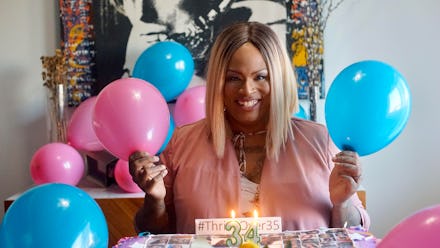The average black trans woman doesn’t live beyond 35. On my 34th birthday, I’m celebrating them too.

Before I knew about statistics, barriers to access or determinants of health, I intuitively knew that black trans women weren’t expected to live long. When I was 19 and homeless in the dark underbelly of Santa Monica Boulevard — where many trans women in Los Angeles find themselves after being alienated by society — the oldest black trans woman I’d ever met was a 38-year-old named Tracey.
Stuck on an insidious loop of tragedy, trauma and trapped truths, Tracey’s life was cut short. She was found in a motel room the night she’d died. Her death reportedly occurred from “natural causes.” There was nothing natural about her death, her circumstances or the way in which she was failed by a society that demonized her existence.
Now, 15 years later, I know about statistics. Combine three of the most vulnerable communities in the United States into one identity and you get a statistic that reveals the average black trans woman doesn’t live beyond the age of 35. At 38, Tracey had defied the average lifespan of a black trans woman.
When the Supreme Court, in the Masterpiece Cakeshop v. Colorado Civil Rights Commission case, ruled that the baker with strong religious beliefs had the right to a neutral hearing by the civil rights commission, the world seemingly erupted. I couldn’t help but wonder why the level of passion and reaction post-Cakeshop is never expressed when it’s time to show up for black trans people.
In the LGBTQ communities, marriage equality and all that pertains to the “G” of the spectrum supersedes everything: The lack of acknowledgment for intersectionality and cultural issues within our communities leaves black trans women in quicksand to fend for ourselves. Our lives are being cut short at alarming rates.
I celebrated my 34th birthday with a special cake made by West Hollywood’s Cake and Art. The cake featured photos of 77 young, black trans women who lost their lives to transphobic hate. None of the women lived to see their 35th year, in line with the statistic. Since wedding cakes get more attention than black trans women in our community, I figured I’d use cake as a platform to discuss the disproportionate realities we face; it’d be easier for society to digest.
My cake was meant to spread awareness, educate and inspire at the same time. That’s when the idea for #ThriveOver35 came to me. It wouldn’t be a campaign that would underscore the gut-wrenching statistics we face, but an opportunity to help black trans women reimagine ourselves somewhere other than in an open casket.
Black trans women are murdered and reduced to nothing more than a lit candle and a hashtag. Rarely do news reports address the circumstances that placed us in front of the barrel of the gun.
#ThriveOver35 provides black trans women with a platform to declare victory every year we survive the multi-marginalization we navigate on a daily basis. I’m encouraging trans women under 35 to use the hashtag on their birthday (or any day) to let the world see that we’re here and we won’t be erased. Trans women over 35 can do the same, as proof that we’re out here beating those statistics every single day. The campaign also gives allies the chance to show up for us. We’re not looking to be saved; we’re hoping to secure better resources so that we can save ourselves.
When I posted my cake on social media, I heard from people all over the world: Some shared their experiences of being trans women in their particular countries, others were resolute in working as allies. Antionette Diamond, the mother of Devin Diamond, a nonbinary trans person who was killed in June 2016, saw the #ThriveOver35 campaign online and recognized her child at the top of my cake. In my comment section, she said, “Thank you for including my [angel emoji].” She messaged me expressing her tremendous gratitude, stating that she was happy to see her child, yet sad at the same time.
My heart shattered. There were so many moments in which my mother almost got the same phone call Antionette did. No mother should have to bury their child, and no one should have their life cut short simply for living their truth. Black trans women deserve better. We are loved. We have families, friends, lovers and allies who need us just as much as we need them. More importantly, we deserve to pursue our goals, dreams and aspirations while discovering our life’s purpose. Life should begin at 35 — not end.